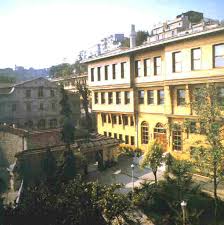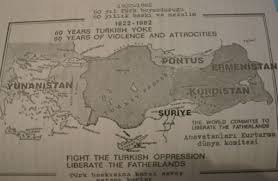



The basic mistake made when there is an unsolved problem or when a problem is left hanging, is going around the problem itself without trying to go down its essence and thus to the real answers. To put in other words the basic mistake is the inability to focus on the efforts to find the “right answers” to the “right questions”.
One can find the traces of such mistakes during the process of finding a solution to the problems arising from The Fener Greek Patriarchate.
These problems primarily arise from ecumenical claims and the demand that Turkey should recognize this claim.
In the text of the Lausanne Treaty, which is regarded as the fundamental treaty of the Turkish Republic, there is no mention of the Patriarchate. In Lausanne, political and administrative privileges given to the Patriarchate during the Ottoman period were lifted and it was agreed that it only had spiritual authority. Other than that it is not stated in the text whether it has any authority outside the Turkish borders or any ecumenic title..
Ecumenism is a problem which essentially concerns “church laws and tradition”. Therefore it is out of the question that the Turkish Republic accepts the ecumenism of the Fener Greek Patriarchate.
What is more is that the claims of ecumenism “theologically” have a grave moral flaw:
“Vatican, 1600 years later, had abandoned its principles of faith regarding that the churches except those in Rome, Antakya and Alexandria, which are defined in the Iznik Clerical Council in 325, could not be regarded as ecumenic.
Thus, the claim that the Church in Istanbul was founded by St. Andrew, the first apostle of Jesus Christ, was accepted behind the scenes by Vatican, yet under the guarantee of “the infallibility of the Pope”.
However, until November 30th 2008 it was claimed that the Fener Greek Patriarchate was promoted to a patriarchate from episcopacy due to the “a unified church a unified state” motto of the Eastern Roman Empire and for political reasons and that the St. Andrew myth was made up to justify this on religious grounds. However it was a widely known fact that there is no document indicating that St. Andrew had come to the city of Istanbul, since the city was not even founded in year 30.”[1]
Moreover it a weird contradiction that the Fener Greek Patriarchate is defined and asserted as ecumenic only by those involved in power struggle in the region and not by Orthodox countries and communities. Barthelomeos is consistently defined as the leader of 300 million Orthodox. However it is quite interesting that those who grant him the title “Ecumenic” are not Orthodox themselves.”[2]
Apart from the theological discussions, issues related to the contemporary practices and demands of the Patriarchate also need to be unraveled:
Is the Fener Greek Patriarchate a national church or is it universal (ecumenic[3])?
If it is so, than why are the main churches subordinate to the Patriarchate are led only by those of Greek origin? Why is the Fener Greek Patriarch, Jerusalem Patriarch, French Metropolitan Bishop etc. are only chosen from among those of Greek origin?
What’s more; “Why is the Fener Greek Patriarch is regarded as a national church even above the church in Greece?”
Why do some Greek Metropolitan Bishops force into the churches of those from different nationalities (eg. Bulgarian Church) and hold a sermon in Greek language?
And other questions follow:
Will only those of Greek origin benefit from the Heybeliada Clergy School, great efforts of which were shown in the establishment and which has become a source of political pressure on Turkey? Will the Fener Greek Patriarchate, which has authority over only 300 thousand people among 300 million Orthodox congregation, consider the Orthodox congregation, which is dispersed to a vast area and which is out of its control, as non-existent at the expense of creating duality in the Orthodox world?
It does not seem possible for the Fener Greek Patriarchate – with its single-sided demands and fait accompli – to reach a common solution neither with the Orthodox world nor with Turkey unless reliable and logical answers are found to these questions.
Sibel Keskin
[1] Gozde Kilic Yasin, Global Religious Struggle, Cumhuriyet, July 14th, 2008.
[2] Above-mentioned article.
[3] The term ecumenic derives from the Greek word “oikoumeni“, which means universe, cosmos and world.


Leave a Reply